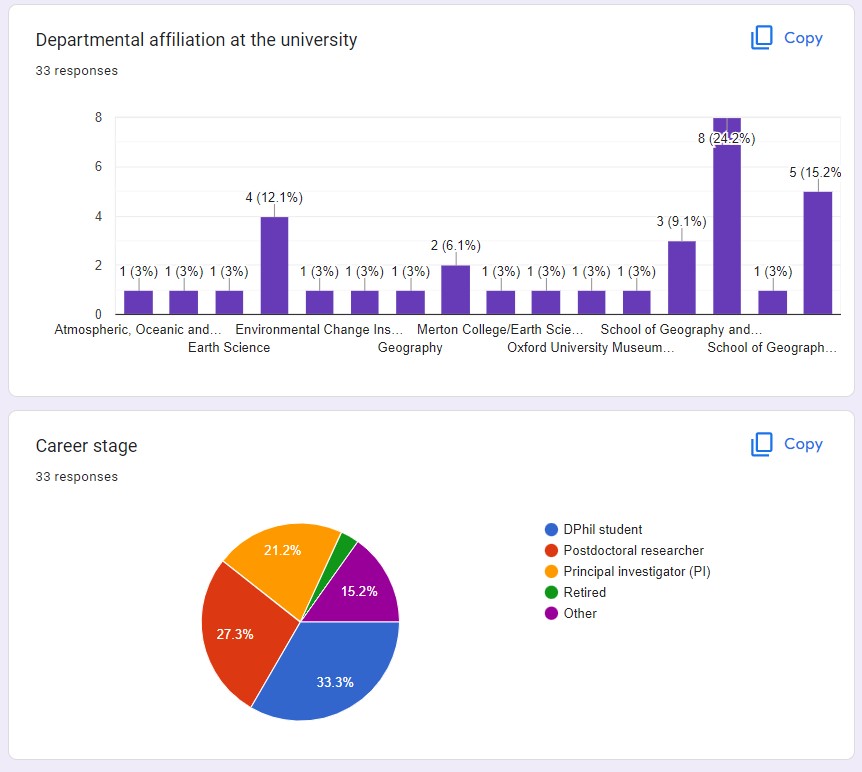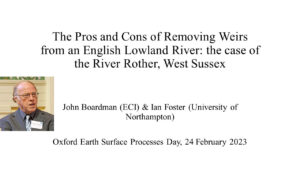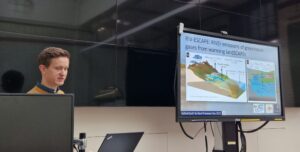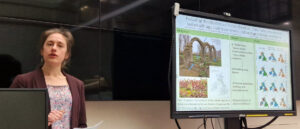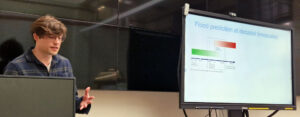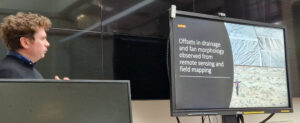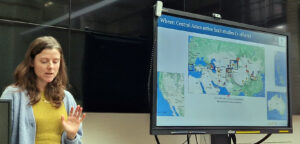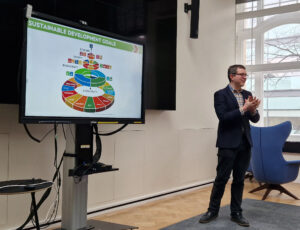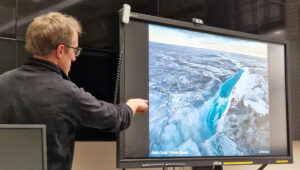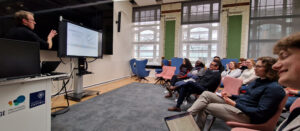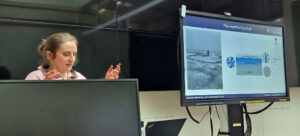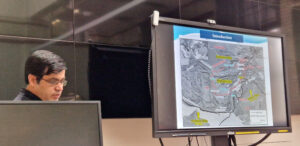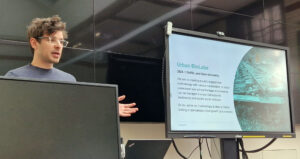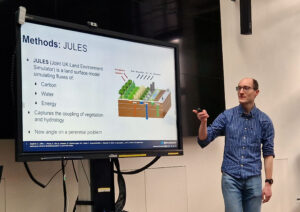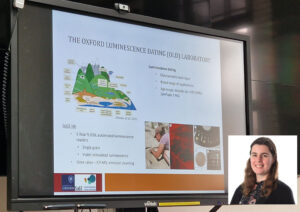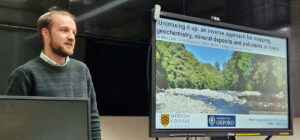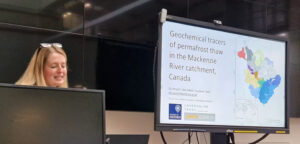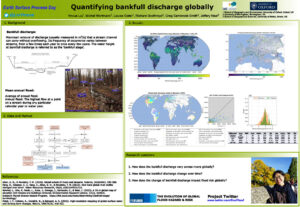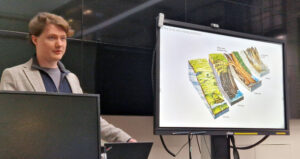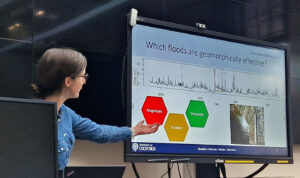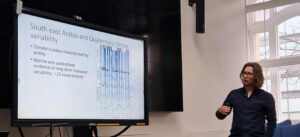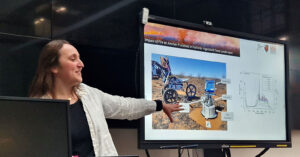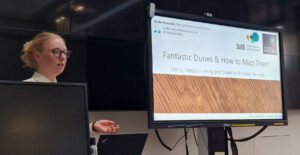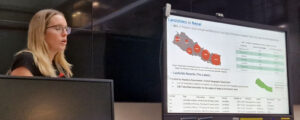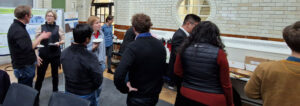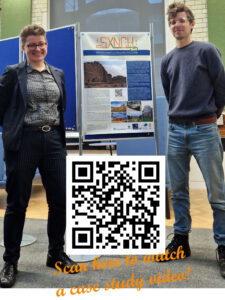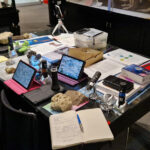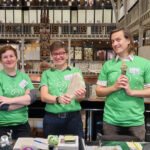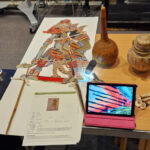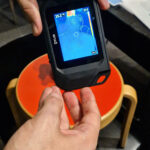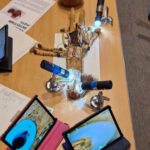The inaugural Oxford Earth Surface Processes Research Day took place in the new East Lab of the School of Geography and the Environment (SoGE) on Friday, February 24th, 2023. The event brought together a diverse group of researchers who share a common theme but approaching it with a multitude of methods and perspectives. An engaging, fascinating, and stimulating exchange of ideas and expertise was made possible through this cross-departmental gathering. The event echoes SoGE’s former SEED event and we are hoping that a similar event will be repeated in the future.
- John Boardman (ECI)
- Bob Hilton (Earth Sciences))
- Jenny Richards (OxRBL, St John’s College))
- Simon Moulds (SoGE)
- Neill Marshall (Earth Sciences)
- Tamarah King (Earth Sciences)
- Jack Matthews (OUNHM)
- Ian Hewitt (Math.Inst.)
- Keen audience
- Tilly Woods (Math.Inst.)
- Zakeria Shnizai (Earth Sciences)
- Martin Michette (OxRBL, SoGE)
- Marcus Buechel (SoGE)
- Julie Durcan (SoGE)
- Alex Lipp (Earth Sciences)
- Ella Walsh (Earth Sciences)
- Yinxue Liu (SoGE)
- Max Van Wyk de Vries (SoGeE)
- Anya Leenman (SoGE)
- Sam Woor (OxRBL, SoGE)
- Rosie Huck (SoGE))
- Maike Nowatzki (SoGE)
- Kelsey Doerksen (Department of Computer Science)
- Networking /poster session
- SXNCH – QR for video!
Oxford Earth Surface Processes Day Agenda
1. John Boardman (Environmental Change Institute) The Pros and Cons of removing weirs from an English lowland river: the case of the River Rother, West Sussex.
2. Bob Hilton (Earth Sciences) RIV-ESCAPE – A project to quantify how CO2 and CH4 release from river surfaces respond to warming.
3. Jenny Richards (School of Geography and the Environment) Future resilience of sedum-based soft capping as a conservation approach for heritage sites in Britain and Ireland.
4. Simon Moulds (School of Geography and the Environment) Skillful decadal flood prediction.
5. Neill Marshall (Earth Sciences) Fingerprinting large earthquakes – Insights from geomorphic and paleoseismic investigations.
6. Tamarah King (Earth Sciences) A summary of active tectonics research in the Department of Earth Sciences.
7. Jack Matthews (Oxford University Museum of Natural History) International Geodiversity Day: A New Opportunity for Public and Policy Engagement.
8. Ian Hewitt (Mathematical Institute) Mathematical modelling in the cryosphere.
9. Tilly Woods (Mathematical Institute) Modelling melting, structure and microbial activity of an ice sheet surface.
10. Zakeria Shnizai (Earth Sciences) Active tectonics and geomorphology of Afghanistan using satellite imagery.
11. Martin Michette (School of Geography and the Environment) Dynamic Heritage Environments. Introduction to the Oxford Resilient Buildings and Landscapes Lab (OxRBL) /Sites at the Intersection of Natural and Cultural Heritage (SXNCH) /Research on ecosystem synergies in the historic environment
12. Marcus Buechel (School of Geography and the Environment) Quantifying the hydrological consequences of widespread afforestation in the UK.
13. Julie Durcan (School of Geography and the Environment) Holocene socio-environmental relationships in the Indus Valley.
14. Alex Lipp (Earth Sciences) Identifying tracer and pollutant sources in drainage networks from point observations using an efficient convex unmixing scheme.
15. Ella Walsh (Earth Sciences) Geochemical tracers of permafrost thaw in the Mackenzie River catchment.
16. Yinxue Liu (School of Geography and the Environment) Quantifying bankfull discharge globally.
17. Max Van Wyk de Vries (School of Geography and the Environment) Automated mapping of slow-moving landslides from space: hazard and geomorphic impact
18. Anya Leenman (School of Geography and the Environment) Quantifying geomorphologically effective floods using large-sample geomorphology.
19. Sam Woor (School of Geography and the Environment) The aggradation of alluvial fans in response to Late Quaternary monsoon variability over the last 300 ka in the central and eastern Hajar Mountains, northern Oman.
20. Rosie Huck (School of Geography and the Environment) Earth, Wind, and Fire: Impact of Fire on Aeolian Processes in Partially Vegetated Dune Landscapes.
21. Maike Nowatzki (School of Geography and the Environment) Fantastic dunes and how to map them (using deep learning and satellite remote sensing).
22. Kelsey Doerksen (Department of Computer Science) Precipitation-Triggered Landslide Prediction in Nepal using Machine Learning & Deep Learning.
Finally some stats of our attendants:
